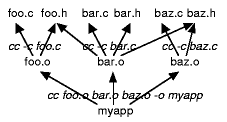Understanding Make
Why Make?
Its easy and efficient to build small projects with a compile command.
For example,
cc myapp.c -o myapp.
However, this method becomes very inefficient for large projects such as the
ones you will be building in this class. For example, running
cc foo.c bar.c baz.c -o myapp
when baz.c changes means you are wasting time compiling the other files.
Ideally, you would like to only compile baz.c and then link it with the other
object files. You could do this yourself, but make lets you automate it. The
goal of make is to build your project with the minimum amount of work.
Basic Idea
You supply make with a file (whose default nameis " Makefile") which
describes the dependenciesbetween files in your project and a method for
satisfying each dependency. These dependenciesform a DAG - for example:

Now, when make is run, for each dependency, if the target file is older than
the file it depends on, it will execute the method to bring the target file
up to date. For example, suppose we change foo.h. Make will recognize that foo.o and bar.o depend on it and will recompile them. Next, it will relink myapp.
Simple Makefile
A makefile consists of one or more rules which have the form:
target : source(s)
[TAB]command
[TAB]command
The first character of each command line must be a TAB. The makefile
corresponding to the above graph is
myapp: foo.o bar.o baz.o
cc foo.o bar.o baz.o -o myapp
foo.o: foo.c foo.h
cc -c foo.c
bar.o: bar.c bar.h foo.h baz.h
cc -c bar.c
baz.o: baz.c baz.h
cc -c baz.c
Comments Any line beginning with a `#' is ignored by make.
Makedepend
One
headache with makefiles is making sure that you have specified dependencies
to header files correctly. Makedepend is a tool that will do this for
you automatically. You run makedepend on all your source files:
makedepend foo.c bar.c baz.c and it will add the correct dependencies to
Makefile. You can use the -MM option of gcc to do the same thing.
Macros
Makefiles can have macro definitions and uses. For example, with
CC = gcc
CCOPT = -g -DDEBUG -DPRINT
#CCOPT = -O2
foo.o: foo.c foo.h
$(CC) $(CCOPT) -c foo.c
foo.c will be compiled for debugging or with
optimization depending on which CCOPT isuncommented. Macros definitions can
also be modified when they are used. For example,
OBJECTS = foo.o bar.o baz.o
dep:
makedepend $(OBJECTS:.o=.c)
will cause makedepend to be called on foo.c, bar.c and baz.c when the dep
target is made.
Suffix Rules
Often, a project has many rules that have common commands applied
to files with the same suffixes. For example, each of the .o files in our
example depend on its parent .c file and is compiled with the same command.
We can replace this with a suffix rule:
.c.o :
$(CC) $(CCOPT) -c $*.c -o $@
$* is a special macro for the prefix the two files share and
$@ contains the target name.
Default Rules
Make has a lot of built in defaults that are used when a user-defined rule
can't be found. For example, it can infer that foo.o depends on foo.c and
use a generic C compilation rule to update foo.o. In general, AVOID USING THE
DEFAULT RULES.
A Menagerie of Makes
There are many different Makes with widely varying features. Perhaps the
most popular alternate make is GNU Make, which has the advantage of having a
manual freely available. Some makes exploit the parallelism of the dependency
graph to distribute the make across a number of workstations.
To Learn More
- man make
- O'Reilly books in bookstore
A Larger Example
CC = gcc
#CC = cc
CPP = g++
INC = -ILEDA/incl
LIB = -LLEDA
CCOPT = -g -DDEBUG -DSPACEMONITOR\
$(INC) $(LIB)
#CCOPT = -O2 $(INC) $(LIB)
CPPOPT= $(CCOPT)
GENERALS = cache.o disthandler.o \
internals.o dispatcher.o util.o \
builder.o group.o relation.o \
errprint.o diffmaprle.o aapair.o \
aablock.o stdrel_llb.o \
stdrel_sortseqpair.o
DISPLAY = display.o
INTERNALS = HPF.o
DISPLIBS = -lP -lG -lL -lWx -lX11 -lm
all: fung
fung: libdist.a libfxtimers.a fung.o \
$(DISPLAY)
$(CPP) $(CPPOPT) fung.o \
libdist.a libfxtimers.a \
$(DISPLAY) $(DISPLIBS) -o fung
libdist.a : $(GENERALS) $(INTERNALS)
ar ruv libdist.a $(GENERALS) \
$(INTERNALS)
$(DISPLAY): display.C
$(CPP) $(CPPOPT) -c display.C \
-o $(DISPLAY)
.c.o :
$(CC) $(CCOPT) -c $*.c -o $@
dep:
makedepend $(INC) \
$(GENERALS:.o=.c) \
$(INTERNALS:.o=.c) \
$(DISPLAY:.o=.C)
